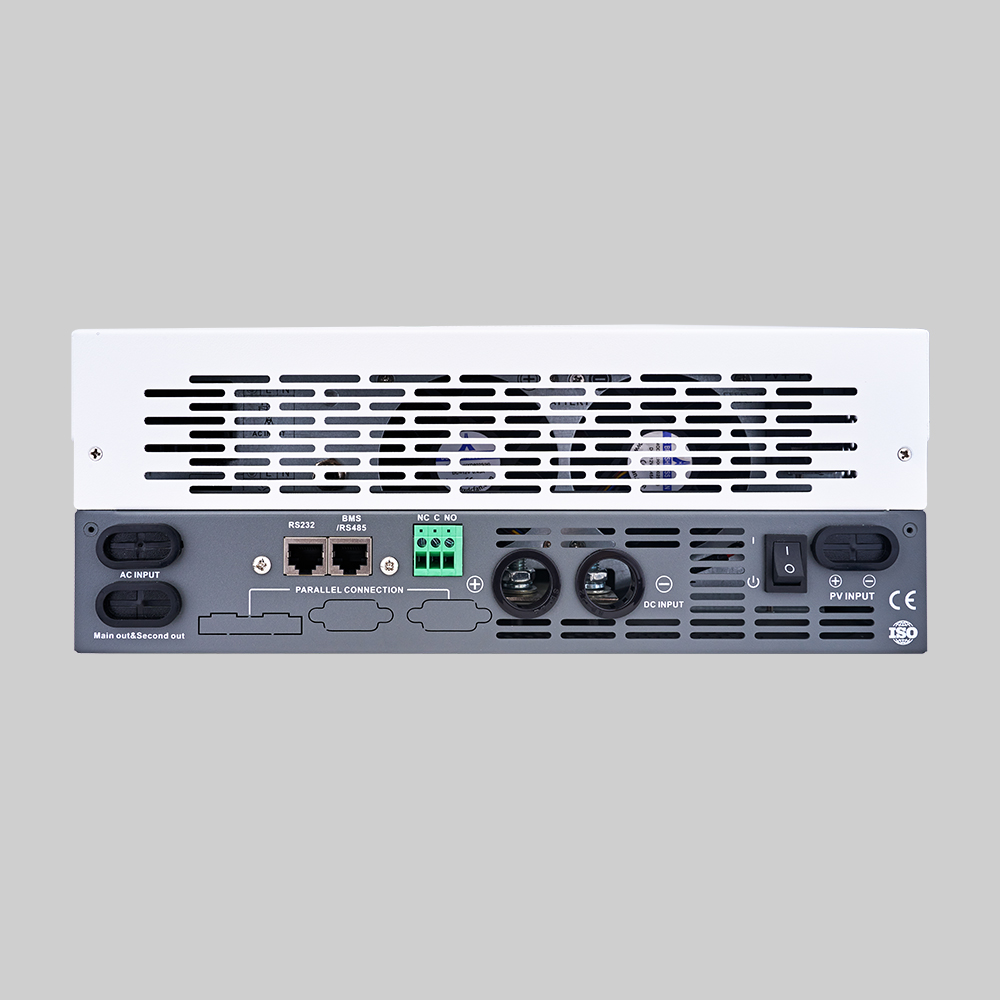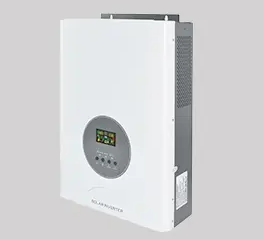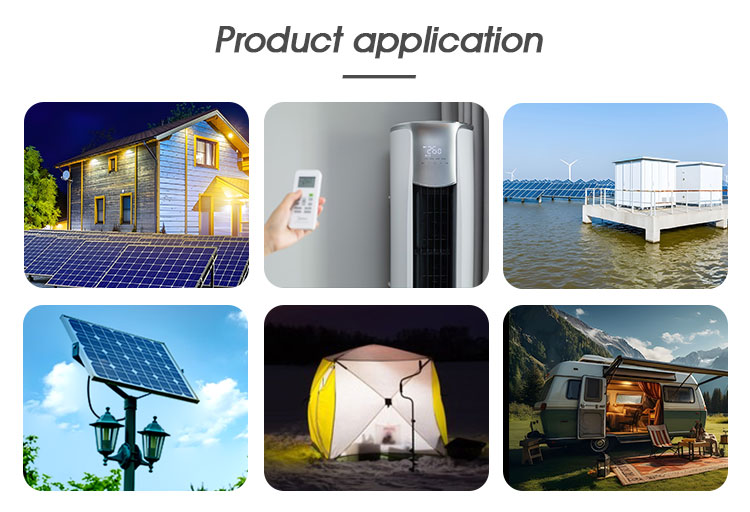Views: 0 Author: Site Editor Publish Time: 2025-07-18 Origin: Site










Have you ever wondered how solar systems manage both energy production and storage? A hybrid inverter solar system is the answer. It combines solar and battery inverters into one unit to convert DC to AC and store energy for later use.
In this post, we’ll discuss how these systems simplify energy management, improve efficiency, and reduce grid dependency. You'll also learn why hybrid inverters are crucial for homeowners, businesses, and off-grid setups.
A hybrid inverter solar system is a combination of solar energy conversion and battery storage in a single unit. It manages the energy coming from solar panels, stores excess power in batteries, and can draw power from the utility grid when needed. This integration simplifies energy management, making the system both efficient and easy to control.
Hybrid inverters can work in both grid-tied and off-grid systems, providing flexibility to meet a wide range of energy needs. They allow users to generate, store, and use energy when it’s most efficient, reducing the need to rely on the grid.
Hybrid inverters convert DC (direct current) electricity generated by solar panels into AC (alternating current) electricity. AC power is the type of electricity used by most household appliances and businesses.
In a hybrid system, excess solar energy is stored in batteries for later use, allowing you to tap into your solar energy even when the sun isn’t shining. When the batteries are full, the hybrid inverter can also send excess power back to the grid or draw power from the grid when needed, ensuring a continuous supply of energy.
This integrated approach reduces the complexity of having separate devices for energy conversion and storage, which leads to lower installation costs and a simpler overall system.
There are two main types of hybrid inverters: MPPT and PWM.
MPPT (Maximum Power Point Tracking) technology is one of the most advanced features in hybrid inverters, helping to maximize the power output from solar panels. Solar panels produce DC (direct current) electricity, but the amount of power they generate can vary depending on factors such as time of day, weather conditions, and the angle of sunlight. MPPT technology ensures that the inverter continuously monitors and adjusts the voltage and current to extract the maximum power available from the solar panels at any given moment.
This means that even when sunlight conditions are not ideal, such as on cloudy days or during early morning or late afternoon hours when the sun is lower in the sky, MPPT technology helps the system operate at peak efficiency. It does this by finding the optimal point at which the solar panel generates the most power—often referred to as the "maximum power point." This adjustment process is done automatically by the inverter, without the need for manual intervention.
MPPT hybrid inverters are especially effective in areas with variable sunlight. These regions experience frequent changes in solar energy output due to fluctuating weather conditions, such as clouds or changing seasons. MPPT technology adjusts the inverter’s performance accordingly, ensuring that the system is always working at its best.
Moreover, MPPT hybrid inverters are commonly used in larger solar systems. They are capable of handling high energy demands, making them ideal for residential or commercial applications where the need for energy storage and backup is greater. Whether you are looking to power a large home, a business, or an industrial operation, MPPT hybrid inverters are an excellent choice for ensuring high efficiency and maximum energy production.

PWM (Pulse Width Modulation) is a simpler, cost-effective technology used in some hybrid inverters to regulate the flow of energy into the battery storage system. Unlike MPPT, PWM does not adjust the voltage and current to maximize the output. Instead, it regulates the energy flow by adjusting the width of the pulses of power sent to the battery. This method is less complex and requires less processing power, which makes it a more affordable option for smaller systems.
While PWM inverters are less efficient than MPPT in terms of energy extraction, they still offer a reliable and functional solution for certain solar applications. PWM hybrid inverters are suitable for smaller solar setups or regions where sunlight conditions are stable and consistent. These systems typically don’t require the advanced energy optimization of MPPT, making PWM a cost-effective choice for those who live in areas with minimal variability in sunlight.
For example, areas that experience consistent sunshine throughout the year, such as some parts of the desert or tropical regions, can benefit from PWM technology, as it provides sufficient energy conversion and storage without the added cost of MPPT inverters. In these regions, the difference in energy generation due to changes in sunlight intensity is minimal, so the simpler PWM technology is often adequate for meeting energy demands.
One of the main advantages of PWM hybrid inverters is their affordability. They tend to have a lower upfront cost compared to MPPT systems, making them more accessible for people with smaller energy needs or those who are looking to install a more budget-friendly solar solution. However, for those who expect frequent changes in weather patterns or higher energy demands, MPPT hybrid inverters would be a better fit.

Hybrid inverters offer several key functions that improve both the efficiency and flexibility of solar power systems.
A hybrid inverter is designed to perform bidirectional energy conversion, meaning it can convert both DC (direct current) to AC (alternating current) and AC to DC. This bidirectional functionality allows the system to store excess energy during peak sunlight hours, which can then be used later when the demand is higher or when the sun isn’t shining.
Hybrid inverters are equipped with MPPT technology that tracks the maximum output of solar panels. This ensures that the system is always operating at the highest efficiency, extracting the most energy possible regardless of changing weather conditions or the time of day.
Many modern hybrid inverters also offer real-time power monitoring. This means users can track the energy they generate, consume, and store through apps or the inverter’s display. This functionality is important for homeowners and businesses who want to have complete control over their energy usage and costs.
Hybrid inverters offer flexibility by working in both grid-tied and off-grid configurations. In a grid-tied system, any excess energy generated by the solar panels is fed back into the grid, often with credits or payments for the extra energy. This helps reduce energy costs for the user.
In an off-grid system, the hybrid inverter ensures self-sufficiency, drawing power from the solar panels and battery storage. Even in remote areas where grid power is not available, a hybrid inverter can provide a continuous, reliable supply of electricity.

For homeowners, hybrid inverters provide greater control over energy consumption. They allow households to store excess solar energy for later use, reducing dependency on the utility grid. Hybrid inverters are particularly beneficial in areas prone to power outages, as they can automatically provide backup power using the stored energy, ensuring that essential devices continue to function during grid failures.
By optimizing solar power usage, hybrid inverters help homeowners cut electricity bills and increase their energy independence.
For businesses, hybrid solar systems offer substantial cost savings. By storing extra solar energy, companies can avoid peak demand charges and reduce overall electricity costs. Additionally, hybrid inverters help improve sustainability by increasing the use of renewable energy and reducing reliance on fossil fuels.
Businesses can also use hybrid inverters to ensure reliable backup power during outages, minimizing downtime and disruptions to operations.
Hybrid inverters are an ideal solution for off-grid locations, such as rural areas or islands where reliable grid access is limited or unavailable. They combine solar power generation, battery storage, and backup power into one system, making it easier to live self-sufficiently.
These systems provide renewable energy in remote locations without relying on fossil fuels or grid power, offering a sustainable solution for isolated communities.
| Advantage | Hybrid Inverter Solar | Traditional Inverter |
|---|---|---|
| Energy Management | Combines solar power conversion and battery storage in one unit. Enables real-time monitoring of energy usage. | Only converts DC to AC for immediate use; no energy storage or monitoring. |
| Cost-Effectiveness | High initial cost but provides long-term savings by reducing grid reliance. Storage helps lower electricity bills. | Lower upfront cost but higher long-term electricity expenses. |
| Backup Power During Outages | Provides backup power by storing energy in batteries, ensuring uninterrupted power during grid failures. | No backup power; requires additional equipment for outages. |
| Sustainability & Environmental Impact | Maximizes renewable energy use, reduces carbon footprint, and minimizes reliance on fossil fuels for backup power. | Limited sustainability impact; lacks storage for renewable energy. |
| Flexibility & Versatility | Works in both grid-tied and off-grid systems. Can feed excess energy to the grid or operate independently. | Primarily designed for grid-tied systems only. |
| Energy Independence | Reduces reliance on utility companies, offering greater energy independence with solar power and battery storage. | Requires constant connection to the grid, increasing dependency. |
| Improved Efficiency | MPPT technology optimizes energy production even with variable sunlight. Energy is stored for later use. | No MPPT; excess energy is lost or sent to the grid. |
| Smart Technology Integration | Integrates seamlessly with home energy management systems, providing real-time insights into energy consumption. | No smart technology; basic functionality without monitoring. |
| Maintenance Requirements | Fewer maintenance needs as it combines multiple functions into one unit, simplifying upkeep. | Requires separate systems for solar power and energy storage, adding complexity. |
| Scalability | Easily scalable by adding more solar panels or batteries to meet future energy needs. | Limited scalability without adding separate systems for energy storage or more panels. |
The table above compares the advantages of hybrid inverter solar systems with traditional systems, focusing on aspects such as energy management, cost-effectiveness, and sustainability. Hybrid inverters combine solar power conversion and battery storage into one unit, offering real-time energy monitoring and efficient energy management. This enables users to store excess energy and reduce reliance on the grid, leading to long-term savings on electricity bills.
Traditional inverters, on the other hand, only convert DC to AC power and lack energy storage capabilities. Hybrid inverters provide backup power during outages, while traditional systems require additional equipment for power backup. They are also more flexible, as they work in both grid-tied and off-grid setups.
Hybrid inverters maximize renewable energy use and minimize reliance on fossil fuels, making them a more sustainable choice. They also offer better efficiency through MPPT technology and integrate seamlessly with home energy management systems, giving users full control over their energy consumption.
As solar technology continues to evolve, hybrid inverters are becoming an essential part of the clean energy movement. They offer greater efficiency, cost savings, and environmental benefits compared to traditional solar systems. Whether you are looking for backup power during outages, a way to reduce your electricity bills, or a sustainable energy solution for remote locations, hybrid inverters provide a reliable and versatile option.
Hybrid inverters offer energy efficiency, backup power, and greater energy independence. They simplify energy management by combining solar and battery storage in one unit.
Choose a hybrid solar inverter if you want to optimize energy use, reduce reliance on the grid, and enjoy reliable backup power. Consider factors like energy needs, location, and budget when making your decision.
A: A hybrid inverter solar system combines a solar inverter and a battery inverter into one device, managing power from solar panels, battery storage, and the utility grid.
A: The hybrid inverter converts DC power from solar panels into AC power for immediate use, stores excess energy in batteries, and draws power from the grid when needed.
A: Hybrid inverters provide energy management, cost-effectiveness, backup power during outages, sustainability, and flexibility in both grid-tied and off-grid systems.
A: Hybrid inverters store excess energy in batteries and provide backup power, while traditional inverters only convert DC to AC for immediate use.
A: Choose a hybrid inverter if you need energy storage, want backup power, or plan for energy independence, especially if your area has frequent power outages or fluctuating energy costs.